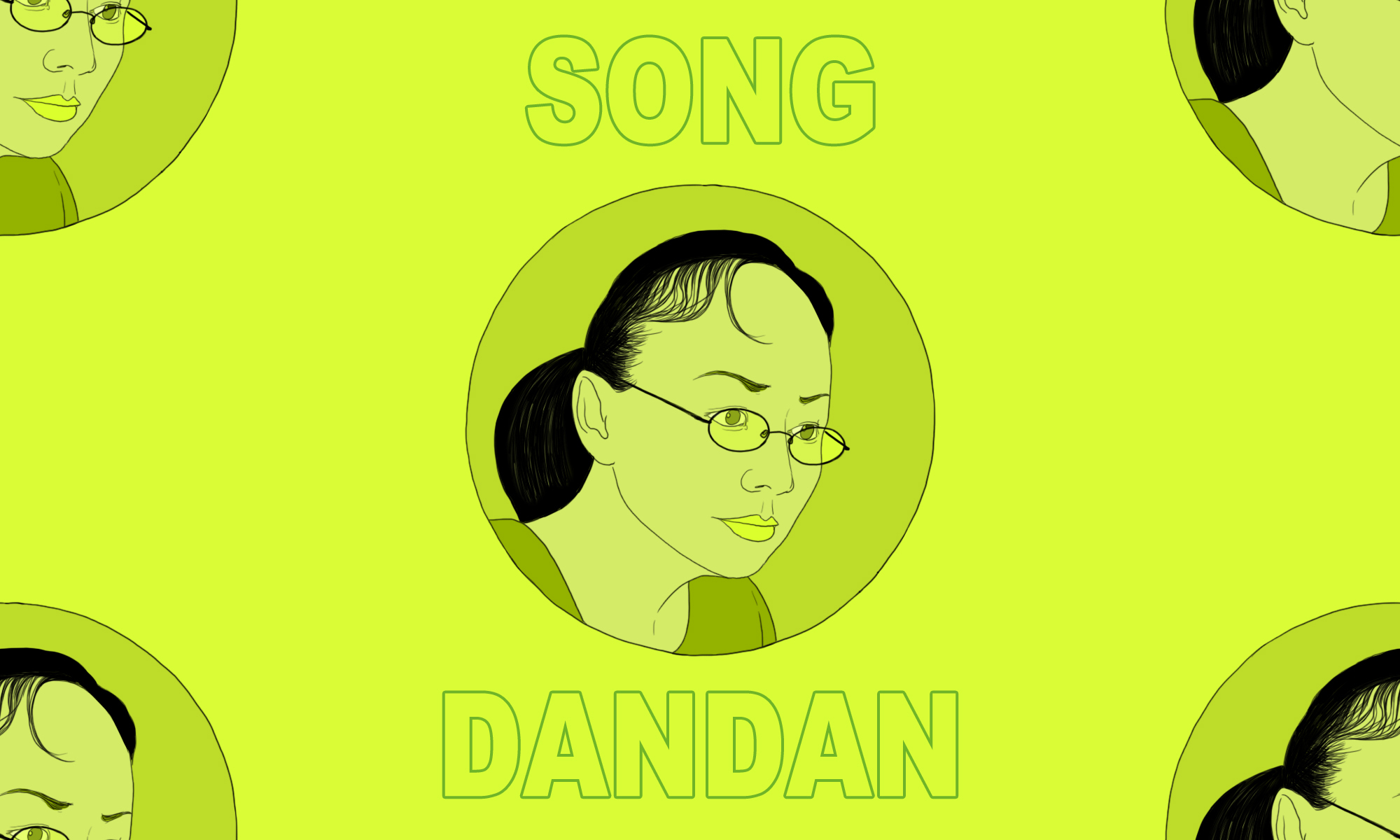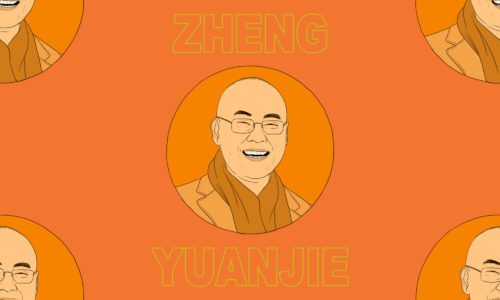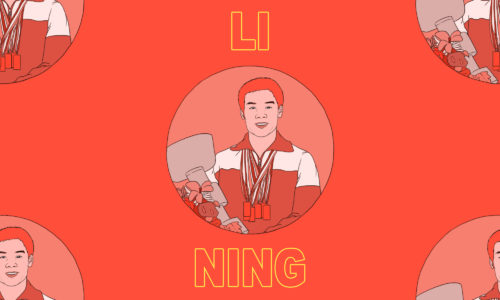Chloé Zhao made history when she became the first Asian woman to win Best Director at the Golden Globes on February 28. Among the plaudits she received, perhaps the most remarkable came from her legendary stepmother, who wrote on Weibo: “My baby, I really don’t know how to congratulate you! Each of your new awards exceeds our imagination and gives us great surprises.” When she was younger, Zhao “chose a path that we were never optimistic about, but could only respect…You are the legend of our family.”
High praise coming from an actress as renowned as Sòng Dāndān 宋丹丹, a household name in China. Song had shared in Zhao’s highs and lows, paying for her stepdaughter’s London school fees out of her own pocket and (according to Song’s 2007 autobiography) helping a teenage Zhao pick out clothes and write nice things for her biological mother on Valentine’s Day.
Who is Song Dandan?
An excellent comedian, with a string of China’s biggest awards to her name. During the 1990s and early 2000s, Song managed to land roles in some of the most popular and memorable productions in Chinese comedy, in sketches, sitcoms, and film.
Born in a Beijing military compound in 1961, she had originally craved serious roles. Earning a place in the elite Beijing People’s Art Theater in 1983, Song dreamed of perhaps one day winning an Oscar (in 2005 she would host a mock Oscars to thank her family and friends for making her dreams come true). She began carving a space in serious stage dramas, including a role as Constanza, Mozart’s wife, in the 1986 Chinese version of Amadeus.
But it was in comedy that she really made her name. In the 1990s, Song regularly appeared in the CCTV Spring Festival Gala, becoming a staple of the show. The writing and performances were of high quality, still considered the benchmark by online users, reposted on Weibo as a reminder of how good the gala used to be compared to today’s meager and cheesy offerings.
Her first role was in the sketch “Lazy Man’s Blind Date” (懒汉相亲 lǎnhàn xiāngqīn), a quick shoo-in to fill a time gap that had suddenly opened. Playing a coy peasant with a nasal Shandong patois, Song is easily wowed by what she thinks is a color TV (a sign of great wealth and status in the 1980s) but is in fact a cardboard box in a darkened room. Having agreed to the role before she saw the script (thinking her role would be something more intellectual), Song nearly withdrew. She had been wary about the idea of going into comedy, but her excellent performance — on only five days’ notice — along with her ridiculous Shandong accent made her a talent in demand.
Soon she was a regular performer in the gala throughout the 1990s, together with her comedy partner Zhào Běnshān 赵本山 — a famous cross-talk comedian — watched by families across China. Perhaps her best role was in “Yesterday, Today, Tomorrow” (昨天, 今天, 明天 zuótiān, jīntiān, míngtiān) in 1999, in which she nails the part of an old peasant woman from China’s northeast, arrived with her husband to be interviewed for the gala.
It tapped into the time-honored tradition of mocking country bumpkins arriving in the big city, but also the backward rural world they had been living in. Sitting cross-legged on the interviewer’s sofa as if it were her kang back home, she boasts about how her two missing front teeth had been “gloriously laid off” (光荣下岗 guāngróng xiàgǎng, a common phrase from the reform and opening up period, when many at underperforming companies were sacked in the name of marketization). She also says (starting from 9:37 in the video below) how she had made a sweater for her husband in their younger years by gathering up stray wool from the collective flock, and was punished by local cadres for stealing the socialist wool. It made its mark on Chinese society: even today, those who exploit loopholes to obtain discounts are said to be “pulling wool” (薅羊毛 hāo yángmáo).
Song always found comedy a bit of a challenge. “Making the audience laugh is a very difficult thing, more pressurized than trying to make the audience cry,” she said in a 2020 interview. But some years at the Spring Festival Gala saw more serious offerings. “Super Guerillas” (超生游击队 chāoshēng yóují duì) in 1990 had Song and her other comedy partner, Huáng Hóng 黄宏, acting as a married pair of migrant workers on the run from the family planning offices for having yet another child on the way (Song really was five months pregnant at the time). They already had three daughters but were determined for a son. The pair spend the sketch bickering about their poor lot in life, made povertous by children born along the way.
It made her very famous — but her most memorable role was yet to come. She landed a role in I Love My Family (我爱我家 wǒ ài wǒ jiā), directed by her husband Yīng Dá 英达 — the show that would introduce the Western sitcom format to China. While studying in the U.S. in 1980, Ying Da had watched The Cosby Show, and was inspired by its humorous take on the chaos of the lives of an everyday modern family. He resolved to transfer the idea to a Beijing family during the reform and opening up period. Although only airing for one year, the show saw numerous reruns, with every Chinese person feeling they could identify with one of the show’s six main characters. There was someone there for all the different facets of society at that time: from the retired cadre grandfather and old revolutionary Fu Ming, always taking charge but confused by this new world of economic opening, to the young daughter Jia Xiaofan, who hopes to leave to study in the U.S.
Part of the show’s success was its ability to make quick jabs at Chinese society and politics in a way that would be considered risqué now. In the very first episode, Fu Ming, lounging in a Mao suit in the family’s living room, tells of his troubles of being demoted — his desk moved into the rooms of the All-China Women’s Federation, saying if he went to the office too often, “I’d have to visit the family planning committee” (to roars of laughter from the studio audience). It didn’t get away without some complaints for taking potshots at honorably retired officials. But it’s remembered with great fondness today across the country. Even the Global Times has admitted that increased censorship means modern Chinese sitcoms, compared to I Love My Family, “lack the bite that is needed to make them truly impactful.”
From there, Song’s career went from strength to strength. In 2004, she was cast in another mother role in A Family With Children (家有儿女 jiā yǒu érnǚ) — “The best and most classic drama that you should have seen after the 90s,” states the most upvoted comment for the show on Douban. It was another must-see sitcom, centered on a remarried couple trying to raise three children from two previous marriages. Brimming with feel-good vibes, the show utilizes the family’s unusual position (at the height of the one-child policy) for maximum comic effect.
Perhaps she was a little too successful as a comedian, at risk of being typecast. “Perhaps because of the sketches…there are no film and television dramas looking for me at all,” she wrote in her autobiography. “The 30s are the best age for an actor, but I only acted in A Family With Children.” Although she never quite recreated the success of the above productions, in 2007 she reunited with Zhao Benshan when she landed a (more serious) supporting role in the black comedy Getting Home. Zhao is an earthy migrant worker, carrying his dead friend back across China, fulfilling an oath each had made that if one of them died on the job they’d return their body to their family.
Comedy was never really what Song wanted to do. She stopped taking roles with laughs, bored by offerings of the same old lady/mother/aging love interest characters. She had a successful career as a stage actor after all, in serious high-flying dramas like Lǎo Shě’s 老舍 Teahouse. During the Spring Festival Gala of 2020, Song announced this was the last time she would be on the gala’s stage. “My childhood is over,” wrote one crestfallen netizen.
Song has said in interviews that in the future, she will spend 10% of her time on work (but only acting in things she likes) and 90% of her time with her family. Chloé Zhao, it appears, has been kept in good hands.
Chinese Lives is a weekly series.






